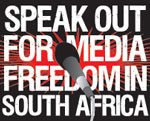






"These SANEF guys are very naive for thinking that the police would abide by that peace agreement. This is a serious crisis and I don't like the way SANEF is handling it," a frustrated journalist told Bizcommunity.com this week on condition of anonymity because of the sensitivity of the subject.
"I think they should adopt a more revolutionary approach," the journalist said without elaborating.
The South African National Editors' Forum condemned these attacks.
While some say police ignorance of the general law and attacks on the media smell of a hidden agenda, others, however, believe the hostility towards the media is being fuelled by government's hostile rhetoric towards the media.
Wits University senior lecturer Lesley Cowling told Bizcommunity.com this week: "Aggressiveness and hostility towards the media from public servants is probably fuelled by the statements of government ministers and spokespeople, in which the media is characterised in a hostile way.
"Note for example, the intemperate language of ANC spokesperson Jackson Mthembu in reaction to media criticism of Jimmy Manyi's appointment as head of Government Communication and Information System (GCIS).
"When the media is constantly characterised as partisan, biased, insane, and in the pocket of (white) elites, it creates the climate for hostility against individual journalists.
"However, this is to be a fundamental misunderstanding of how journalists see their role in a democracy, which is to pay close attention to government, and to scrutinise and record how government agencies function," Cowling pointed out.
With almost 50 people killed every day, South Africa is listed among the most dangerous countries in the world, and despite its police force's huge financial resources, equipment and manpower other African countries would love to have, crime is on the rampage as law enforcers are almost invisible.
Media rights campaigner Raymond Louw said yesterday, 7 February, it was noteworthy that 30 policemen arrived to arrest a photographer whereas even at a murder scene such a large number of officers would not appear.
Four newsmen have been harassed and violently ill-treated by police in the past three months. These include Sowetan photographer Antonio Muchave and journalist Penwell Dlamini.
Louw, deputy chairman of the SANEF media freedom committee, added: "We are concerned that, despite our protests, there appears to be no programme initiated by police headquarters to inform police officers to keep their hands off journalists carrying out their legitimate duties.
"We have urged journalists and their papers to take these matters to court and some have been, but we have seldom heard of an outcome which provides a lesson for the police.
"The only way such conduct will stop will be when not only criminal charges are laid against the police involved and diligently pursued by all the papers, but also actions for substantial damages are instituted."
National Police spokesperson Colonel Vishnu Naidoo declined to comment, referring all the enquiries to Neville Malila.
Malila was not available for comment at the time of going to press.
